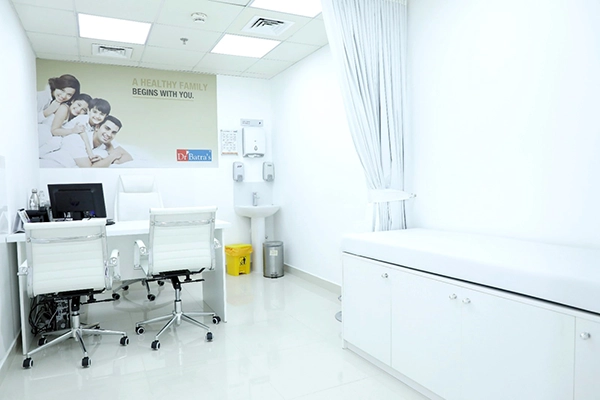Irritable Bowel Syndrome (IBS) Treatment in Dubai & Abu Dhabi
If you are looking for a natural and safe treatment for IBS in Dubai or Abu Dhabi, you can get a holistic and personalised treatment plan at Dr Batra's® clinics. Our approach is rooted in homeopathy and unlike conventional treatments that only suppress symptoms, our treatment is focused on finding and addressing the root cause of your condition. It is designed to help you restore your gut health, reduce or eliminate your symptoms and prevent future recurrences.
Book your appointment today and let our experienced homeopathic specialists help you find a long-term, sustainable solution for a healthier gut.
Why Choose Dr Batra's® for IBS treatment
At Dr Batra's® clinics in Dubai and Abu Dhabi, we provide a natural long-term solution for Irritable Bowel Syndrome (IBS). Our treatment focuses on balancing gut health, reducing inflammation and strengthening digestion using safe homeopathic remedies - without side effects.
40+ Years of Homeopathy Expertise
Dr Batra's® has beena one of the world's foremost chain of homeopathic clinics for over 40 years. We have successfully treated thousands of patients with IBS. We have always focused on identifying the root cause of your symptoms - whether its stress, dietary triggers or gut microbiome imbalance
Personalized IBS Treatment Plans
IBS symptoms vary from person to person. That's why we conduct a detailed consultation session with you, which enables us to recommend a treatment plan that is customised for your needs based on your symptoms, lifestyle and dietary habits
Safe Approach with No Side Effects
Conventional medicines can often cause dependency or side effects. But our homeopathic approach is rooted in natural treatments and remedies. Our aim is to improve your digestive system, regulate your bowel movements and strengthen your gut health - all in a way that is free from side effects
Holistic Approach to Gut Healing
IBS is often linked to stress, anxiety and dietary habits. Our approach goes beyond symptom relief by addressing the gut-brain connection, lifestyle changes and food sensitivities to provide lasting results.
Get IBS Treatment at Conveniently Located Clinics in Dubai & Abu Dhabi
Reviews of Dr Batra’s® IBS Treatment in Dubai & Abu Dhabi
Our Treatment Process for IBS
Step 1: Initial Consultation
Our homeopathic specialist will spend 30 to 45 minutes understanding your digestive health, dietary habits, stress levels and medical history. This assessment helps us determine the severity of your IBS, identify the triggers and create a treatment plan that best suits your needs.
Step 2: Homeopathic IBS treatment
We prescribe personalised homeopathic remedies that help regulate gut motility, reduce bloating, ease abdominal discomfort and restore digestive balance - without any side effects.
Step 3: Dietary and Lifestyle Modifications
Since IBS symptoms are closely linked to diet and stress, we provide customised nutritional guidance and lifestyle recommendations to help manage food sensitivities and improve gut health.
Step 4: Ongoing Monitoring and Support
We track your progress through regular follow-ups. This ensures continuous improvement in digestion and symptom relief. Our approach focuses on long-term gut health and overall wellbeing.
What is Irritable Bowel Syndrome (IBS)?
Irritable Bowel Syndrome (IBS) is a common digestive disorder. It affects the normal functioning of the intestines, leading to symptoms like abdominal pain, bloating, diarrhea, constipation or both. It is classified as a functional gastrointestinal disorder, which means that it impairs the functioning of the digestive tract, even though there are no structural abnormalities.
IBS is often triggered by factors such as stress, dietary choices, hormonal changes or gut microbiome imbalances. The condition varies from person to person. Some people might experience mild occasional symptoms while others may have persistent and debilitating discomfort.
Although IBS is not life-threatening, it can significantly impact a person's daily life by affecting digestion, energy levels, and overall well-being. Identifying the triggers and managing the symptoms through the right treatment approach can help improve gut health and restore quality of life.
Who can get IBS?
IBS can affect anyone, but certain individuals are more prone than others to developing this condition. Various factors, like genetics, lifestyle and stress levels can contribute to an increased risk of IBS.
Some groups that are more likely to experience IBS include:
- Women: IBS is more common in women, especially those who are experiencing hormonal changes such as pregnancy or menopause.
- People under 50: While IBS can occur at any age, it is more frequently seen in people who are below the age of 50.
- People with a family history of IBS: If a close family member has IBS, the chances of developing it may be higher.
- People with high stress or anxiety levels: Emotional distress, anxiety and depression can worsen IBS symptoms and even trigger flareups.
- People with a history of food intolerances: Sensitivities to certain foods such as dairy, gluten or high-FODMAP foods can contribute to IBS symptoms.
- People with previous gut infections: A history of bacterial or viral infections affecting the digestive system may increase the likelihood of IBS.
IBS is a highly individual condition. It means its triggers and symptoms can vary from person to person. It is recommended to identify the risk factors as early as possible and seek help to manage the symptoms and prevent severe flare-ups.
Symptoms of IBS
Symptoms can vary from person to person and range from mild discomfort to severe digestive distress. Some people experience flare-ups which could be triggered by food, stress or hormonal changes.
The most common symptoms of IBS are the following:
- Abdominal pain or cramping: This pain is often relieved after passing stool. The level of pain can be anywhere from mild discomfort to severe cramping.
- Changes in bowel habits: IBS can cause alternating episodes of diarrhoea (IBS-D), constipation (IBS-C) or a mix of both (IBS-M).
- Bloating and excessive gas: Many IBS patients experience persistent bloating and increased gas production, which can lead to discomfort.
- Mucus in stool: This is a fairly common symptom, and it can be a sign of IBS, even in the absence of blood.
- Urgency to pass stool: People with IBS may feel an intense and sudden need to use the restroom
- Incomplete bowel movements: It is common for some people to feel that they have not fully emptied their bowels after going to the toilet.
- Nausea and indigestion: IBS can sometimes cause nausea, heartburn or a general feeling of unease in the stomach.
- Fatigue and difficulty sleeping: IBS symptoms can impact your sleep quality, and it might make you feel tired, and reduce your energy levels.
IBS symptoms can flare up due to specific triggers, including stress, certain foods and hormonal changes. If left unmanaged, they can impact your daily life adversely, so it is essential to seek treatment for long-term relief.
Causes of IBS
The exact cause of Irritable Bowel Syndrome (IBS) is not fully understood, but several factors are known to contribute to its development. IBS is often linked to a combination of gut sensitivity, abnormal muscle contractions, and changes in gut bacteria.
Here are some of the most common causes of IBS:
- Abnormal Gut Motility: The muscles in the intestines may contract too much or too little, leading to diarrhoea, constipation, or both.
- Increased Gut Sensitivity: People with IBS often have a heightened sensitivity to pain and discomfort in the digestive tract, even when there is no underlying disease.
- Imbalance in Gut Microbiome: Changes in the balance of good and bad bacteria in the gut can trigger IBS symptoms, leading to bloating, gas, and irregular bowel movements.
- Food Intolerances & Dietary Triggers: Certain foods—such as dairy, gluten, caffeine, artificial sweeteners, and high-FODMAP foods—can aggravate IBS symptoms.
- Stress & Anxiety: The gut and brain are closely connected, and stress can worsen IBS by affecting digestion and gut motility.
- Hormonal Changes: IBS symptoms are more common in women, particularly during menstruation, pregnancy, or menopause, indicating a hormonal link.
- Post-Infectious IBS: Some people develop IBS after a severe bout of food poisoning or gastrointestinal infection, which can lead to long-term changes in gut function.
While IBS does not cause permanent damage to the intestines, its symptoms can significantly affect quality of life. Identifying the root cause and managing symptoms with the right treatment approach is essential for long-term relief.
Risk Factors of IBS
While IBS can affect anyone, certain factors increase the likelihood of developing the condition. Understanding these risk factors can help individuals manage symptoms more effectively and seek timely treatment.
Common Risk Factors for IBS:
- Age: IBS is more commonly diagnosed in people under 50, though it can develop at any stage of life.
- Gender: Women are more likely to experience IBS than men, possibly due to hormonal fluctuations.
- Family History: If a close family member has IBS, you may be at a higher risk due to genetic and environmental influences.
- Mental Health Conditions: Anxiety, depression, and chronic stress can contribute to IBS by affecting gut function and pain perception.
- Food Sensitivities: Certain foods, such as dairy, gluten, artificial sweeteners, and high-fat meals, can act as IBS triggers.
- Gastrointestinal Infections: A history of severe food poisoning or gut infections can lead to post-infectious IBS.
- Sedentary Lifestyle: A lack of physical activity can slow down digestion and contribute to symptoms like bloating and constipation.
- Antibiotic Use: Long-term antibiotic use can disrupt the gut microbiome, increasing the risk of IBS symptoms.
Many of these risk factors can be managed with lifestyle changes, dietary modifications, and proper medical guidance. Seeking treatment early can help prevent symptoms from worsening over time.
FAQs
What is Irritable Bowel Syndrome (IBS)?
IBS is a chronic gastrointestinal disorder characterized by symptoms like abdominal pain, bloating, gas, diarrhea, and constipation. It affects the large intestine and requires long-term management.
What causes IBS?
The exact cause of IBS is unknown, but factors such as stress, certain foods, alcohol consumption, and lifestyle habits are known to trigger or worsen symptoms.
How is IBS diagnosed?
Diagnosis involves assessing symptoms, reviewing medical history, conducting a physical examination, and performing tests to rule out other conditions.
Can IBS be cured?
While there is no definitive cure for IBS, effective management through treatments like homeopathy, lifestyle changes, and dietary modifications can significantly reduce symptoms.
How does homeopathy help in treating IBS?
Homeopathy offers individualized remedies that address the root cause of IBS, aiming for long-term relief without side effects.








